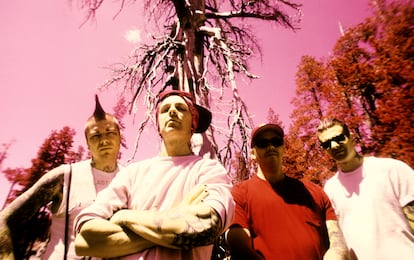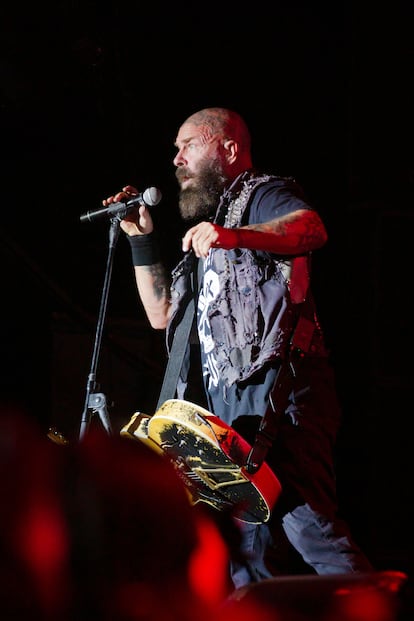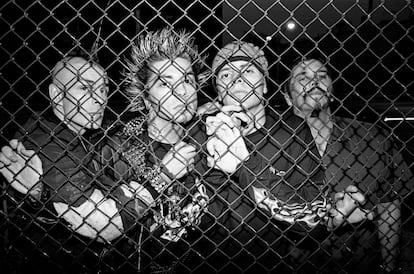The ordeal and salvation of Tim Armstrong, ‘the Bob Dylan of punk’ went into rehab to form Rancid: ‘It was like a Rocky movie’
The singer and guitarist, currently touring for the group’s latest album, has surprised everyone by reuniting for a new project this year with Jesse Michaels, his former bandmate from three decades ago in Operation Ivy

These are good times for nostalgic nineties punk fans. As NOFX (bidding farewell) and Blink-182 (returning) are once again packing out venues, while Green Day have been completing their tour and album, Rancid joined the party in June with Tomorrow never comes. This is their first album in six years and it has been backed by stellar reviews and an international tour. This was not the only delight this year for fans of Tim Armstrong (Albany, California, 57 years old). April brought the surprise release of Raid, the debut song from a new group called Doom Regulator for which Armstrong has teamed up with Jesse Michaels, a bandmate going back 34 years in the short-lived, yet legendary Operation Ivy. This was a closing of the circle both belated and cathartic for a special artist, who Brett Gurewitz of Bad Religion called “the Bob Dylan of punk,” who transformed his personal redemption into an artistic undertaking.
Possibly the most influential one-record band since the Sex Pistols, Operation Ivy were the first flagship band of 924 Gilman Street, the Berkeley (California) venue that gave birth to Green Day and The Offspring and set the scene for the resurgence of the genre. This was yet another attempt to jump on stage by Tim Armstrong and Matt Freeman. They were buddies with a passion for music who had ended one group after another because they couldn’t find anyone who would take it as seriously as they did. Freeman volunteered to take out the trash to obtain free admission to Gilman concerts. It was there that they met Jesse Michaels, son of a writer and university professor, who was the charismatic and intellectual figure they were looking for.
With Michaels as singer and lyricist, the group instantly took off. “When I saw how much all those people enjoyed Operation Ivy at Gilman, I knew that it was going to be as significant in their memory as seeing The Avengers or Bad Brains was for my generation,” said Jello Biafra, legendary Dead Kennedys vocalist, in the 2017 documentary Turn It Around: The Story of East Bay Punk. Inspired by the second wave of ska in the U.K., the so-called 2 Tone genre, Operation Ivy launched a third wave with their own music by fusing the genre with punk, where they were pioneers together with The Mighty Mighty Bosstones, also from the U.S. “Their enthusiasm gave the initiative a revolutionary quality. Their music [Operation Ivy’s] was more than a love letter from the United States to English groups like The Specials, The Beat and The Selecter,” wrote the music critic Ian Winwood in his 2018 book Smash!: Green Day, The Offspring, Bad Religion, NOFX, and the ‘90s Punk Explosion, where he also places their only album, Energy (1989), at the same level as Bad Religion’s Suffer (1988) in terms of the revival of the scene.
The band fronted by Michaels and Armstrong, featuring Matt Freeman’s unique bass style of using scales and arpeggios, transformed Gilman’s inclusive community and attracted a diverse crowd of young fans. “It made sense for them to sing of unity [in reference to their song Unity] because they were generating that feeling,” said Devon Morf, singer of the band All You Can Eat. “The ska crowd was at first wary of Gilman, but after Operation Ivy came along, you started to see people in suits and ties.” They soon got involved too. In addition to their anti-racism proclamations, just as Freeman had previously been a garbage collector, Armstrong followed in their footsteps when neo-Nazis began to crowd the band’s venues (in a space for less than 300 people on some nights, 1,000 were packed in) and, as recounted in Turn It Around, he politely asked them to leave, with a baseball bat in his hand.

Operation Ivy were the first Gilman band to tour the country, following calls from all over the U.S. for them to perform at local venues. They did so by using an old car with a wooden trunk, built by Armstrong’s father, to transport their equipment and sleeping in squats. Following the release of their only album by their self-managed label Lookout Records, which sold 2,000 copies in its first year and went on to sell over a million copies, the tickets always sold out. As a result, Lawrence Livermore, the label’s founder, passionately urged music journalists to attend one of Operation Ivy’s performances at the Gilman to bear witness to the emerging musical sensation.
But the pressure had taken its toll on Armstrong, who succumbed to alcoholism and drugs and began to perform poorly in concert. Operation Ivy had only been around for two years, but the band suddenly decided to end the project. The support group for their farewell concert, Green Day, achieved huge success shortly after.
“Let’s get to work”
“They were really artistic, very Berkeley, with lots of ska-punk energy. Along with singing, Jesse Michaels designed the logos, T-shirts and album art. Their shows were exciting, and boys and girls loved them,” journalist Jack Boulware, co-author with Silke Tudor of the 2009 book Gimme Something Better, on San Francisco Bay Area punk, says. When asked if Operation Ivy had continued they could have achieved the sort of mass commercial acceptance that fate had in store for Green Day, Boulware remains skeptical: “Green Day didn’t come out of a college setting, but out of the culture of small-town rockers. They weren’t as esoteric as Operation Ivy, they were called to play in stadiums, with that very distinct and present sound.”
The official reason for Operation Ivy’s break-up was that both Michaels and Armstrong felt that their time was up. “I don’t know why we felt that, but it was a very organic thing. I don’t regret how long it lasted, I think it was perfect,” said Michaels in Turn It Around. However, Lawrence Livermore, one of the contributors to the Smash! book, challenged this story by claiming that it was Jesse Michaels who left the band, leaving his bandmates devastated. “Jesse was from a different background than the other two [Tim Armstrong and Matt Freeman]. They were working class and everything was about playing music. Jesse was more of a dilettante, he’s still a working artist, although now he paints and writes. His attitude was like ‘I’m going to try to get into a band; I’ll see if it’s fun or not. Ok, it’s not that much fun anymore, so I’m gonna something different.’ It’s the privilege of coming from a middle-class background. Tim and Matt couldn’t get their heads around it — why blow the opportunity to do something great?” he explained.
Tim Armstrong’s addictions escalated severely. In the years following the end of Operation Ivy, he was hospitalized four times because of complications due to alcohol and drug use. Having been disowned by his mother, it was Matt Freeman who stuck by his side by taking him to and picking him up from detox clinics and getting him fed. “We were in the band for two years,” recalled Armstrong in the documentary. “We had a hell of a time. And then it was over. I sat down and thought ‘Shit, I haven’t got a group.’ I broke down. I got really hooked on alcohol. I couldn’t do anything else but drink.”
After unsuccessful attempts to form other groups, with Armstrong out of shape and unable to rehearse on a regular basis, his friend issued an ultimatum. “Matt Freeman said he was tired of me breaking his heart, starting a band together, getting drunk and getting screwed. So we were still going to hang out and play, but he wasn’t going to officially join a new band with me until I was one year sober. He asked me to look after myself and promised me that, when I was ready, we’d do it. So I thought, ‘I’ve gotta get sober. Let’s do it.’” Armstrong joined the Salvation Army and succeeded. An impressed Matt Freeman recapped it on camera as follows: “When he came out, he slowly got his life back on track and was itching to start a band. It was like a Rocky movie — let’s get to work!” The experiences of Armstrong, now lyricist, during his rehabilitation inspired Salvation, the song by the group that was to emerge: Rancid.

“When I got the music, oh I got a place to go”
With Rancid, Armstrong and Freeman enjoyed the popular success that the punk movement was experiencing in the nineties, which they themselves had helped to establish. Joined by the outstanding contribution of guitarist and singer Lars Frederiksen, another reformed alcoholic, Rancid were propelled by the unconditional support of Brett Gurewitz, owner of the quintessential punk label, Epitaph Records. “I told Tim that I adored him, I loved his music, his voice, Matt’s bass and if they ever worked together again, I’d give them a contract without hearing a single note,” Gurewitz said publicly. The producer was so devoted to Rancid that, as well as getting a tattoo of the logo, as related in Smash! Epitaph lost a band of the commercial pedigree in The Offspring because of the group members’ feelings of jealousy at the favored treatment for Armstrong and his bandmates, “Gurewitz’s one true and only love.”
The group reciprocated at a time when the bands riding the wave of Green Day’s success were striking gold with multinationals (with the exceptional perseverance of NOFX), Rancid flinched at the million-dollar offers they received, but remained loyal to Epitaph, who they still release their albums with. They were so sought after that Madonna, a frequent visitor to the group’s concerts in the nineties, sent them nude photos to convince them to sign with Maverick Records, the company she founded. “Rancid had a more rugged profile. They weren’t willing to get on stage in skate shorts or pose for photographers with skateboards. Their music touched on anxiety and loneliness, and the idea that the threats lurking in the mean streets could be averted thanks to the union of a family of outsiders. And their audience loved them,” wrote Ian Winwood, the author.
Influenced by The Clash and Stiff Little Fingers, Rancid elaborated on the fusion of styles that characterized Operation Ivy. “Something happens when a person changes while remaining true to who they really are. We saw that when Rancid performed their first concert,” said Green Day frontman, Billie Joe Armstrong, who is not related to his friend despite his surname and, as a fan of Operation Ivy, he recorded a version of the song Knowledge on his band’s first album. Tim Armstrong only had one relapse in 1996, a year after… And Out Come the Wolves (1995), Rancid’s landmark cult album. “He isn’t the first or the last artist to deal with this kind of pressure by drinking and doing too many drugs,” argued his friend Lawrence Livermore.
Although Rancid has occasionally played Operation Ivy songs on stage and invited Jesse Michaels to join them, there was no indication that Armstrong would be formally reuniting with his former bandmate more than three decades later. Of course, this is not a recreation of the old group. There is no Matt Freeman, an essential element of the band. Doom Regulator’s only song to date, Raid, is a full-blown return to the ska roots that inspired their old line-up. No one has offered any further clarification. The single was released along with an Instagram account with a photo of the four members of the band, along with the lyrics and song credits.
Is this a nostalgic homecoming or the ending of Armstrong and Michaels’ unfinished business? “Who cares what people think?” Jack Boulware asks. “They’ve both achieved a lot since Operation Ivy finished: bands, albums, tours, record labels, songwriting, novels, art exhibitions. Jesse even went back to college. But there’s always going to be a connection between those guys. It’s important to keep doing things.” With an eclectic discography packed with side projects, there is little doubt that Armstrong’s passion for music is the fuel for every one of his adventures. As Armstrong himself proclaimed in Radio, a song that has been a permanent feature in Rancid’s repertoire for the past 30 years: “For when the music hits I feel no pain at all. When I got the music, oh I got a place to go.”
Sign up for our weekly newsletter to get more English-language news coverage from EL PAÍS USA Edition
Tu suscripción se está usando en otro dispositivo
¿Quieres añadir otro usuario a tu suscripción?
Si continúas leyendo en este dispositivo, no se podrá leer en el otro.
FlechaTu suscripción se está usando en otro dispositivo y solo puedes acceder a EL PAÍS desde un dispositivo a la vez.
Si quieres compartir tu cuenta, cambia tu suscripción a la modalidad Premium, así podrás añadir otro usuario. Cada uno accederá con su propia cuenta de email, lo que os permitirá personalizar vuestra experiencia en EL PAÍS.
¿Tienes una suscripción de empresa? Accede aquí para contratar más cuentas.
En el caso de no saber quién está usando tu cuenta, te recomendamos cambiar tu contraseña aquí.
Si decides continuar compartiendo tu cuenta, este mensaje se mostrará en tu dispositivo y en el de la otra persona que está usando tu cuenta de forma indefinida, afectando a tu experiencia de lectura. Puedes consultar aquí los términos y condiciones de la suscripción digital.









































